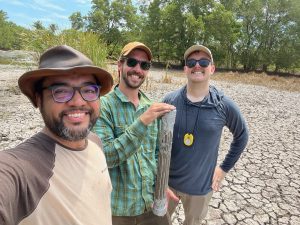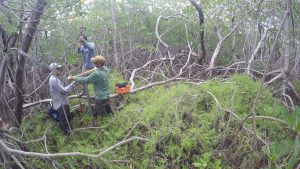Christoper Kiahtipes, Ph.D., curator of the USF Libraries’ Florida Environment & Natural History (FLENH) collections, has been awarded a $152,407 grant from the National Science Foundation for his project “Collaborative Research: Resilience, Experimentation, and Collapse in Small-Scale Fisheries.” Kiahtipes is co-principal investigator with Gregory Herbert from the USF School of Geosciences, and they are investigating long-term changes and environmental resilience in coastal fisheries to see how these unique resources have been affected by people and climate change over the last few thousand years.

Kiahtipes, an environmental archaeologist, and Herbert, a marine ecologist and evolutionary biologist, are collaborating with archaeologists from Temple University, the University of Missouri, and Universidad Honduras in the research. For Kiahtipes, the research goes hand in hand with his role as the curator of one of USF Libraries’ largest strategic special collections. “Field notes and photos are an important part of the FLENH archival collections, from Ogden’s notes from Roatan, Honduras, to Florida Audubon Society’s range reports,” says Kiahtipes. “My role as an active researcher helps me appreciate the wealth of information that comes from these kinds of records and their significance to the projects they come from.”
In June 2024, work began at Guaimoreto lagoon in northern Honduras, an area with many similarities to the coastal landscapes of the Tampa Bay area.
“Our interest is in how local land use practices and regional climate shape fisheries then and now. This area has a lot of parallels with the Tampa Bay area–significant shell mound sites, evidence for manatees in pottery motifs, and extensive mangrove and salt prairie environments. At some point after these sites were built, there appears to have been a significant decline in oyster populations at Guaimoreto Lagoon,” notes Kiahtipes.

The team’s goal is to reconstruct what happened in the lagoon to impact the oyster stocks. Clues will be found in plant remains that have collected in sediment layers over time. To collect the samples the team uses coring equipment to collect vertical columns of sediment and then analyzes the shells, plant microfossils, and chemistry of the sediments to reconstruct change through time.
“Research like this gives us insights into how people and their environments responded to climatic change, sea level rise, and hurricanes,” Kiahtipes explains. “It provides a parallel on the other side of the Caribbean to many of the same marine resources here”
The research is expected to wrap up in 2027, with results expected in 2028. Kiahtipes’ field notes and digital images of plant microfossils will become part of the FLENH/Herbarium collections at USF Libraries.